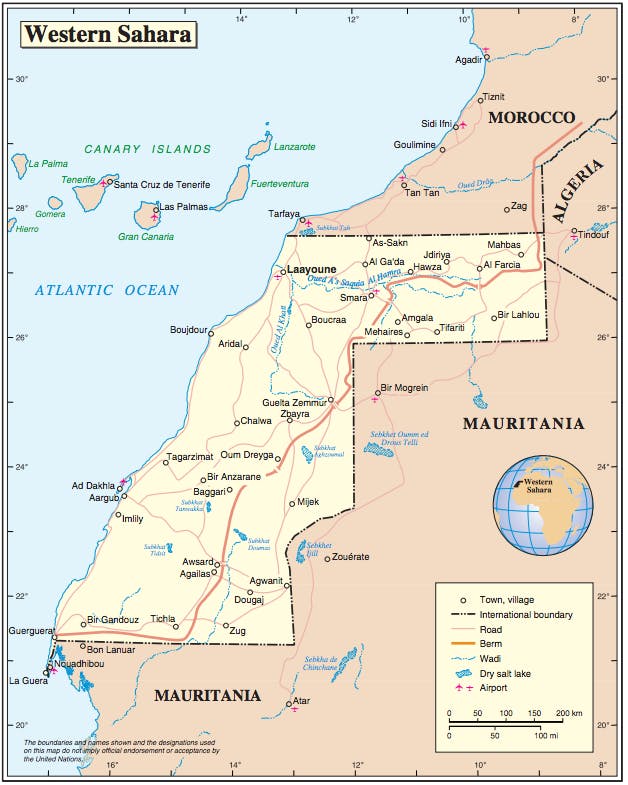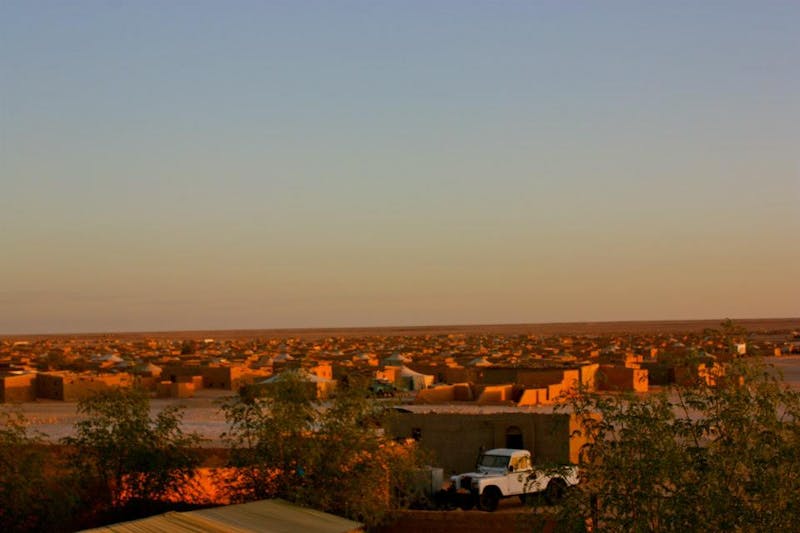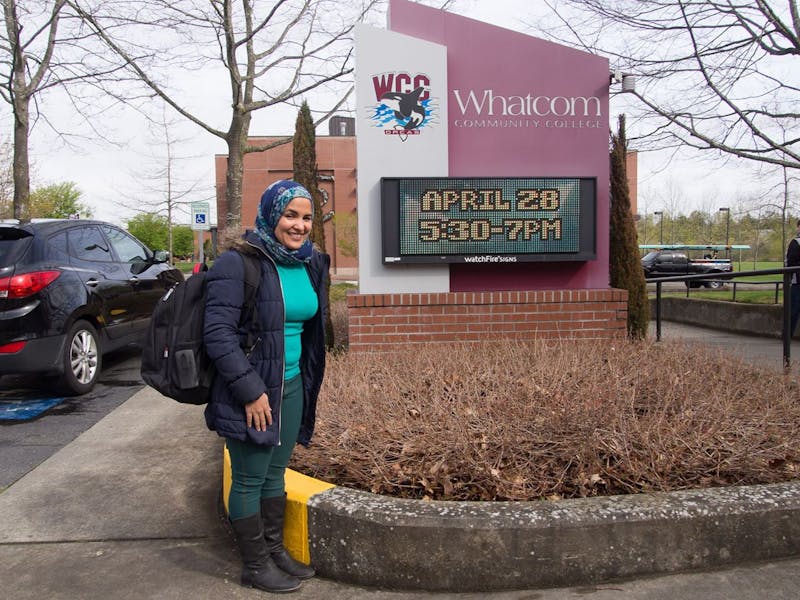“The hardest thing is when people ask me where I’m from,” Najla Mohamedlamin Salma, 27, tells me. “It’s such a long story.”
With her rich North African accent and colorful hijab, Najla cuts an anomalous figure on the streets of suburban Bellingham, Washington. She is a new arrival to this quiet, mostly white city, yet the effusive young woman is accustomed to life as an outsider. Najla came of age in exile alongside 165,000 fellow Saharawi refugees clinging defiantly to life in the brutal Sahara Desert. Growing up in a desolate corner of southern Algeria, Najla was raised on elders’ stories of their lost homeland, the Western Sahara, a resource-rich swath of land under Moroccan control since 1976. Widely considered “the last colony in Africa,” the Western Sahara has been categorized as a “non-self-governing territory” by the United Nations since 1963, listed alongside Guam and the Falkland Islands as remnants of European imperialism.
Najla is in many ways the embodiment of the Saharawi ethos—vigorous and spirited, yet profoundly patient. For years, Najla’s efforts to study abroad ended in frustration and her inevitable return to the desert. But she insists she never lost hope. “There was no future for me in the desert,” Najla says, “but I felt, if I could find my way out, I could really be something.”
Najla is not the only Saharawi disillusioned by the camps. Yet for years, the limitations of camp life have been pushed off as temporary trials, sure to evaporate with the advent of a political solution. Originally, the thousands of refugees who fled the Western Sahara in 1976 hoped their sojourn in Algeria would last a few weeks. Today, the isolated tent-cities are an accretion of four decades of deferred hope.
Najla’s parents were born in the Western Sahara under Spanish colonial rule, and were raised in the tumult that accompanied the decolonization of Africa. They were still young when Spain withdrew from the region in 1976, after prolonged pressure from the international community and the Saharawi resistance front, the Polisario. Fast on the heels of the Spaniards, Moroccan and Mauritanian armies descended on the Western Sahara to unilaterally annex the territory, defying U.N. calls for Saharawi self-determination. The Polisario responded to the Moroccan-Mauritanian advances by declaring the Saharawi Arab Democratic Republic (SADR) on February 27, 1976. “We are determined to continue the struggle until final victory, whatever the sacrifices may be,” declared the SADR’s founding document. “Until our people have completed the liberation of their national territory, there will be neither peace nor stability in this region.”

Najla’s grandfathers, father, and uncles were among the thousands of men who took up arms. The Saharawi forces, though vastly outnumbered, were daring fighters, launching operations deep into enemy enclaves. Mauritania withdrew from the fray in 1979, ceding its claims to Morocco. Clashes between Moroccan military forces and Polisario guerrillas continued for another decade. Najla’s great-uncle was killed in the fighting; her father’s younger brother died in his sleep when his tent was struck by a Moroccan air bombardment. As the war dragged on, the clusters of make-shift shelters in the Algerian desert coalesced into tent-cities. Najla was a two-year-old living in the largest of these camps, Smara, when a U.N.-brokered cease-fire officially ended the military conflict in 1991.
Under the terms of the cease-fire, the U.N. reaffirmed the Western Sahara’s right to self-determination as recognized by The Hague, and called for a referendum to allow the Saharawi people to vote on their future. This referendum was to offer three choices: independence, autonomy under Moroccan rule, or integration with Morocco. “Everyone hoped this would bring us back to our home,” Najla recalls from the stories of older relatives. Yet in the 25 years since the agreement, Morocco has categorically rejected any referendum that includes Saharawi independence as an option.
At the time, Morocco announced it would only accept a plan that demonstrated “full respect of the sovereignty of the Kingdom of Morocco, its territorial integrity and its national unity.” This “territorial integrity” is ubiquitous in Rabat’s political position, which claims the Western Sahara as a fundamentally Moroccan territory and denies any unique Saharawi identity. In contrast, the Polisario asserts the Western Sahara as culturally and politically distinct from Morocco. In 1997, then-U.N. Secretary General Kofi Annan named James Baker, a secretary of state under George H. W. Bush, as his personal envoy to the Western Sahara, tasking Baker with implementing a permanent political settlement. Seven years later, Baker resigned in exasperation, citing irreconcilable differences between the two parties. Since then, the issue has remained in a state of uneasy stagnation.
“You live in a place that is not really a home, just a land of waiting,” explains Najla. Up close, the Saharawi camps, like the political process, appear frozen in time. Worn grooves in the sand serve as roads, snaking between rickety goat pens, drab canvas tents, and crumbling sand-brick houses. The “neighborhoods” bear the names of cities in the occupied Western Sahara—Dakhla, Laayoune, Beir Lahlu—dusty memorials of a hoped-for past. Development would be nearly impossible in such a desolate location, but the crude infrastructure also reflects a defiant refusal to settle, insistent aspirations to a homecoming.

Najla’s childhood was a fairly typical one. She was raised on humanitarian rations and the meat of her family’s desert-toughened flocks. Depending on the time of year, Najla slept in the family tent, under the corrugated-tin roof of their hut, or stretched out beneath the stars. Najla left school after the ninth grade when her mother fell ill, but harbored hopes of returning to the classroom one day. Najla speaks with pride of the passionate commitment to education she inherited from her people: “At the beginning of the war, of course, they had no schools in the camps, but this was no excuse. They found a way. They started teaching, right there in the desert.” Najla’s mother was among those overseeing these ad-hoc classes, where a few precious, dog-eared books served as the curriculum for hundreds of students.
Najla was 17 when she heard that a free English school had opened in her camp. She was thrilled—and intimidated. “I’d always wanted to learn English, but it seemed impossible,” says Najla, speaking a decade later with ease and eloquence. She spent seven years as a student at Essalam English Center. Walking to school, she used the rare opportunity for solitude to practice English vocabulary under her breath. At home, she snuck glances at her class notes as she brewed tea, cleaned house, and tended to her toddling siblings. As she slowly grew more fluent, she began to consider where her new language abilities could take her. “I began to dream of studying in a college somewhere,” she says. “Maybe, I thought, maybe even the United States.”
The improbability of her dream was clear from the start. “My family could never afford to send me,” says Najla, who is one of twelve children. Jobs are scarce in the camps, with most families relying on stipends from the U.N. High Commissioner for Refugees or relatives working abroad. Najla’s mother, Khadija, makes a small salary doing administrative work for schools, while her father, Mohamedlamin Salma, is unemployed. Meanwhile, Najla’s skills in English and Spanish landed her sporadic work as a translator for visiting delegations and journalists.
It was while translating that Najla caught the eye of several visiting American delegates. When they learned of her dream of studying in the United States, they helped Najla apply to community college and raise the $12,000 for tuition through a crowdfunding campaign. Beyond these steps, Najla was confronted with a final hurdle: obtaining a visa. For those like Najla—poor, stateless, North African—chances of being granted a visa to the United States are vanishingly small. Even so, Najla set a date for an interview at the American embassy in Algiers for March 2016, just a few weeks before she was scheduled to begin classes in Washington. Two anxious weeks later, when she learned she’d been granted the visa, Najla had little chance to celebrate—her flight to the U.S. was scheduled two days hence. With a few hasty goodbyes, Najla departed the camps, first northward to Algiers, then on a transatlantic flight bound west.
While Najla settled into her new life in Bellingham, the Western Sahara began making headlines in the international press, a rarity for the region. After a few tense but relatively uneventful years, hostilities between Morocco and the Polisario flared in late March. The escalation was triggered by U.N. Secretary-General Ban Ki Moon’s visit to the Saharawi refugee camps, where he referred to the Moroccan control of the Western Sahara as an “occupation.” Moroccan authorities took offense at this term, expelling U.N. personnel and foreign journalists from the region in protest. The U.N. Security Council debated its response for for several weeks, during which time senior Saharawi officials hinted at a possible military response. On April 29, the Security Council renewed the U.N. mission to the Western Sahara, calling for “a return to functionality” without making explicit calls to reinstate the expelled staffers.
The controversy also stirred latent tensions among the Saharawi diaspora. On the level of daily life, most Saharawi demonstrate an almost preternatural patience—a quiet, abiding strength that is, perhaps, the reason the cease-fire has lasted these 25 years. Yet a growing number of young people, like Najla, are growing dissatisfied with the entropic stalemate. As technology has penetrated the camps, Saharawi youth—who represent an estimated 60 percent of the total population of the camps—are confronted with increasing examples of the world beyond their desert exile. This growing sense of alienation has driven many to seek work or education abroad.
At the same time, many others, like Najla’s two brothers who have enlisted in the Polisario reserves, are eyeing the prospect of renewed military response. In contrast, older Saharawi tend to be more cautious about calling for a return to war, perhaps due to personal memories of the first 16 years of armed struggle and its thousands of casualties.
Parallel to these political debates, residents of the camps maintain a rich lore about the Saharawi homeland. The names of hometowns are frequently on the lips of those who remember life before the war, while children are raised with an intimate, if mythologized, acquaintance with their heritage. Najla, like many of her generation, are quick to assert their desire to “return” to this legendary place, yet she admits that her feelings about the prospect are complex. “I’ve heard stories my whole life of our country,” says Najla, “But is it my home? I don’t know. I’ve never been there. My grandparents were born there, but they are buried in the desert.”
The narrative of return and independence also presents many practical challenges. In 1976, the Moroccan “Green March” sent 350,000 Moroccans into the Western Sahara to settle, massively altering the demographics in the sparsely populated region. Since then, the Saharawi population has struggled with dissolution and political suppression, while disputes over census data pose a major obstacle to any future referendum. With each passing year, the older generation’s nationalist narrative of reclamation is growing increasingly discordant with the facts on the ground.

Despite these ambiguities, no Saharawi believes the camps are the permanent solution, says Najla. On the legal level, the international community agrees. Each year, the issue of the Western Sahara is considered in a hearing at the U.N.’s Fourth Committee on Special Political Decolonization, where supporters of Saharawi independence speak alongside advocates for Moroccan “territorial integrity.” These speeches vary widely in their factual veracity and emotional tenor, and reflect the overall cacophony that surrounds the issue. Janet Lenz, founder of Not Forgotten International, the non-profit that runs Najla’s former school in the camps, describes the ritual as “frustrating and exhausting.”
Mohamed Yeslem Beisat, Saharawi ambassador to the United States, says his people will not relinquish their hope of self-determination, yet he questions how much longer their patience will endure. “We can wait on the U.N. to implement the referendum—but we don’t have much hope for that,” Beisat tells me. He points out that peaceful demonstrations in the Occupied Territories, as they are known to Saharawis, have been ongoing for over a decade, but are met with harsh suppression by Moroccan forces. “The other option is—well, some people are tired of waiting. Their disappointment is very, very strong. They miss their brothers in the Occupied Territories.” This mounting frustration, says Beisat, is leading some to see military action as the last, but necessary, resort. “We feel abandoned by the international community,” says Beisat. “Some people feel they have nothing left to do but to fight.”
Najla hopes that her people will avoid military engagement, but remains openly skeptical of the political process. “To be honest, I really don’t see a solution coming soon.” Najla, sitting in her bedroom in Bellingham, glances at her hands, her body visibly clenching. “We don’t matter ... I mean, not to the countries who have the power to change things, like the United States and France.”
Despite her measured perspective, it’s the intangible, irrepressible hunger for belonging that most haunts Najla. “I’m fed up with being a refugee,” she says, her normally generous laugh turning thin and brittle. When traveling to the United States, Najla carried a ream of documents: a Saharawi-issued “passport” (useful only in countries that have recognized the Saharan Arab Democratic Republic), an Algerian-administered refugee ID, and a fistful of supporting papers. “I want to have an identity. I want other people to accept that identity. I want my brothers to have a better life than I did.”
For Najla, the wasted potential of her people is one of the greatest casualties of the conflict. “We are educated. We have a culture, ideas. We are ready to build a country. Every day that goes by in the camps, more of this is wasted. I hope we won’t lose much more time.”
See Najla in this trailer for the documentary film, Cast in Sand:
Cast in Sand: A tale of two women - Trailer from Olive Tree TV on Vimeo.
